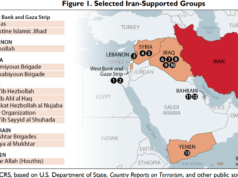The Egyptian government announced Tuesday it would increase its fuel exports to the Gaza Strip by sending emergency diesel supplies and raising the free 17 megawatts it currently provides to 22 megawatts. The decision was made in an effort to alleviate the recent rolling blackout power crisis that began after Gaza’s sole power plant shut down last week due to fuel shortages.
Prior to its shutdown, the level of fuel, which is imported through an elaborate underground tunneling network from Egypt into Gaza, had decreased by 20 percent. While an explanation for the unexpected decline remains unclear, the result has been 18-hour blackouts for the city’s 1.7 million Palestinians and unprecedented electricity rations of 6 hours per day.

Palestinians line up to fill canisters with fuel at a gas station in Gaza City. |
With no energy reserves, Hamas announced it would not be able to provide electricity for hospitals, education, water pumps, waste-water facilities, and other vital infrastructure systems. However, despite Gaza’s dire conditions, Hamas refused Egypt’s proposal to import fuel legally through an Israeli crossing point.
Hamas’s energy authority, Ahmed Abu Al-Amreen, accused Egypt’s alternative of being unacceptable, “because of our bitter experience with the Zionist occupation and the way it controls the delivery of the shipments.” Hamas leaders and sympathizers blame Israel’s blockade for Gaza’s current conditions, turning a blind eye to the fact that Israel was responsible for providing over 900,000 liters of fuel to Gaza’s power station until 2010 when Hamas made the decision to stop those transfers and instead receive fuel from Egypt via its tunneling network.
In creating an economic dependence on Gaza’s black market tunneling system and refusing to utilize Israel’s crossing point, Hamas has escalated the Strip’s energy crisis from a political threat to a humanitarian concern. Hamas, it seems, is more interested in portraying Israel as the antagonist liable for Gaza’s hardships than lifting its people out of darkness.





